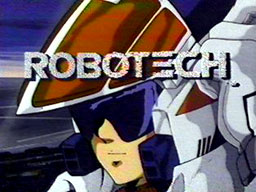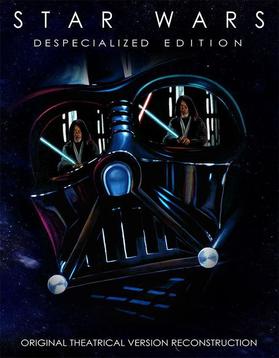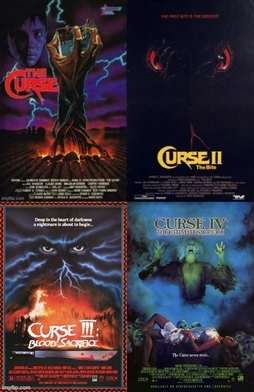
Return of the Jedi is a 1983 American epic space opera film that is a sequel to The Empire Strikes Back (1980). It is the third installment in the original Star Wars trilogy and the sixth chronological film in the "Skywalker Saga". It is directed by Richard Marquand based on a screenplay by Lawrence Kasdan and George Lucas from a story by Lucas, who was also the executive producer. The film follows the ongoing struggle between the malevolent Galactic Empire and the freedom fighters of the Rebel Alliance. As the Rebels attempt to destroy the Empire's second Death Star, Luke Skywalker tries to bring his father, Darth Vader, back from the dark side of the Force. The film stars Mark Hamill, Harrison Ford, Carrie Fisher, Billy Dee Williams, Anthony Daniels, David Prowse, Kenny Baker, Peter Mayhew and Frank Oz.

Star Wars: Episode I – The Phantom Menace is a 1999 American epic space opera film written and directed by George Lucas in his first directorial effort since 1977. The film stars Liam Neeson, Ewan McGregor, Natalie Portman, Jake Lloyd, Ahmed Best, Ian McDiarmid, Anthony Daniels, Kenny Baker, Pernilla August, and Frank Oz. It is the fourth film in the Star Wars film series, the first film of the prequel trilogy and the first chronological chapter of the "Skywalker Saga". Set 32 years before the original trilogy, during the era of the Galactic Republic, the plot follows Jedi Master Qui-Gon Jinn and his apprentice Obi-Wan Kenobi as they try to protect Queen Padmé Amidala of Naboo in hopes of securing a peaceful end to an interplanetary trade dispute. Joined by Anakin Skywalker—a young slave with unusually strong natural powers of the Force—they simultaneously contend with the mysterious return of the Sith. The film was produced by Lucasfilm and distributed by 20th Century Fox.

Star Wars: Episode III – Revenge of the Sith is a 2005 American epic space opera film that is the sequel to The Phantom Menace (1999) and Attack of the Clones (2002). It is the sixth film in the Star Wars film series, the third installment in the Star Wars prequel trilogy, and third chronological chapter of the "Skywalker Saga". It is written and directed by George Lucas, who also served as executive producer. The film stars Ewan McGregor, Natalie Portman, Hayden Christensen, Ian McDiarmid, Samuel L. Jackson, Christopher Lee, Anthony Daniels, Kenny Baker, and Frank Oz.

Hearts of Darkness: A Filmmaker's Apocalypse is a 1991 American documentary film about the production of Apocalypse Now, a 1979 Vietnam War epic directed by Francis Ford Coppola.

Many of the films in the Star Wars franchise have been re-released, both theatrically and on home media formats. Franchise creator George Lucas often altered the films for the re-releases. These alterations range from minor refinements to major changes. The original trilogy was altered the most, although revisions were also made to the prequels. According to Lucas, some changes brought the films closer to his original vision, while others were attempts to create continuity with later films.

The Criterion Collection, Inc. is an American home-video distribution company that focuses on licensing, restoring and distributing "important classic and contemporary films". A de facto subsidiary of arthouse film distributor Janus Films, Criterion serves film and media scholars, cinephiles and public and academic libraries. Criterion has helped to standardize certain aspects of home-video releases such as film restoration, the letterboxing format for widescreen films and the inclusion of bonus features such as scholarly essays and documentary content about the films and filmmakers. Criterion most notably pioneered the use of commentary tracks. Criterion has produced and distributed more than one thousand special editions of its films in VHS, Betamax, LaserDisc, DVD, Blu-ray and Ultra HD Blu-ray formats and box sets. These films and their special features are also available via The Criterion Channel, an online streaming service that the company operates.

Supergirl is a 1984 superhero film directed by Jeannot Szwarc from a screenplay by David Odell based on the DC Comics character of the same name. It is the fourth film in the Superman film series, set after the events of Superman III (1983) and serving as a spin-off of the series. The film stars Helen Slater as Supergirl, along with Faye Dunaway, Hart Bochner, Peter Cook, Mia Farrow, Brenda Vaccaro, and Peter O'Toole, with Marc McClure reprising his role as Jimmy Olsen from the Superman films.
The Godfather Saga[a] is a 1977 American television miniseries that combines The Godfather and The Godfather Part II into one film. It originally aired on NBC over four consecutive nights in November 1977.

Silent Night, Deadly Night is a 1984 American slasher film directed by Charles E. Sellier, Jr., and starring Robert Brian Wilson, and Linnea Quigley. The story concerns a young man named Billy Chapman, who suffers from post-traumatic stress over witnessing his parents' murder on Christmas Eve by a man disguised as Santa Claus and his subsequent upbringing in an abusive Catholic orphanage. In adulthood, the Christmas holiday leads him into a psychological breakdown, and he emerges as a spree killer donning a Santa suit.

The Ratings Game is a 1984 comedy cable television film directed by Danny DeVito and produced by David Jablin. The Showtime comedy stars DeVito and Rhea Perlman, and features Huntz Hall, Michael Richards, George Wendt and Jerry Seinfeld.

Robotech is an American 85-episode adaptation of three unrelated Japanese anime television series made between 1982 and 1984 in Japan; the adaptation was aired in 1985. Within the combined and edited story, Robotechnology refers to the scientific advances discovered in an alien starship that crashed on a South Pacific island. With this technology, Earth developed giant robotic machines or mecha to fight three successive extraterrestrial invasions.
Alien is a science fiction horror and action media franchise centered on the original film series which depicts warrant officer Ellen Ripley and her battles with an extraterrestrial lifeform, commonly referred to as the Alien ("Xenomorph"), and the prequel series following the exploits of the David 8 android and the aliens referred to as the "Engineers".

New Line Home Entertainment was the home entertainment distribution arm of the film production studio of the same name, founded in 1990. According to New Line's website, Misery was the first New Line Home Video release.
The Godfather is a trilogy of American crime films directed by Francis Ford Coppola inspired by the 1969 novel of the same name by Italian American author Mario Puzo. The films follow the trials of the fictional Italian American mafia Corleone family whose patriarch, Vito Corleone, rises to be a major figure in American organized crime. His youngest son, Michael Corleone, becomes his successor. The films were distributed by Paramount Pictures and released in 1972, 1974, and 1990. The series achieved success at the box office, with the films earning between $430 and $517 million worldwide. The Godfather and The Godfather Part II are both seen by many as two of the greatest films of all time. The series is heavily awarded, winning 9 out of 28 total Academy Award nominations.

SP FX: The Empire Strikes Back is a television documentary special which originally aired on CBS on September 22, 1980. Hosted by actor Mark Hamill, it is a behind-the-scenes look at the creation of the special effects in the second Star Wars film, The Empire Strikes Back, which was released that year. The special was written by Richard Schickel and directed by Robert Guenette, who had both previously worked on the 1977 special The Making of Star Wars.

From Star Wars to Jedi: The Making of a Saga is a 1983 television documentary special that originally aired on PBS. It is a behind-the-scenes look at the making of the original Star Wars trilogy, with particular emphasis on the final film, Return of the Jedi.

Classic Creatures: Return of the Jedi is a television documentary, first broadcast on CBS in 1983. It is a look behind-the-scenes of the creation of the various alien creatures from the third Star Wars film, Return of the Jedi, which was released that year. The documentary was presented by Star Wars actors Carrie Fisher and Billy Dee Williams, and directed by Robert Guenette who had directed the previous television specials The Making of Star Wars (1977) and SP FX: The Empire Strikes Back (1980).

Star Wars: The Despecialized Edition, also known as Harmy's Despecialized Edition, is a fan-created film preservation of the original Star Wars trilogy films: Star Wars (1977), The Empire Strikes Back (1980), and Return of the Jedi (1983). It is a high-quality replica of the out-of-print theatrical versions, created by a team of Star Wars fans with the intention of preserving the films, culturally and historically. The project was led by Petr Harmáček, then an English teacher, from Plzeň, Czech Republic, under the online alias Harmy.

The Curse pentalogy is a horror series of five originally unconnected films that were retitled to be part of a supernatural franchise for the American home video market. The series started in 1987 with The Curse. 1993's Curse IV: The Ultimate Sacrifice is notable due to the fact the fourth film was originally made in 1988, predating the third film Curse III: Blood Sacrifice which was released in 1991. The only loose connections between the films are the first two are Italian productions produced by Ovidio G. Assonitis, otherwise the films are completely unrelated.
















